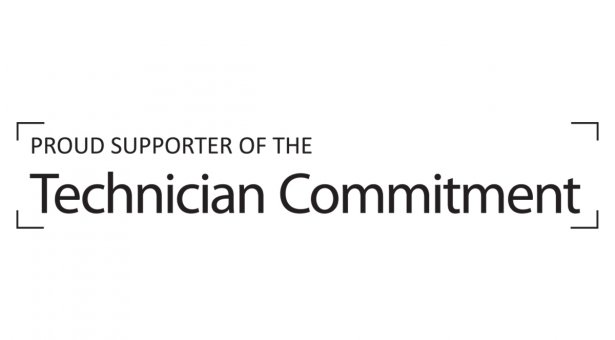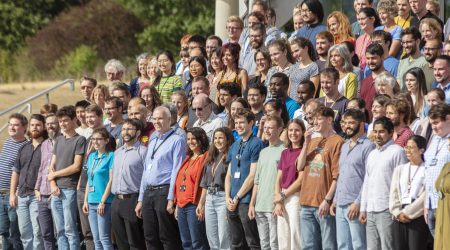Technician Commitment – 1 year on

In May 2017 we joined 35 universities and research institutes backing a pledge to support our technicians by becoming founding signatories of the Technician Commitment.
The Technician Commitment is a sector-wide initiative led by the Science Council, supported by the Gatsby Foundation to help address key challenges facing technical staff working in research.
Four target areas were identified to improve to safeguard vital technical skills;
- Ensure greater visibility of technicians and their impact on our science
- Support technicians to gain recognition through professional registration
- Provide career progression opportunities and clear development pathways
- Ensure the future sustainability of technical skills across the organisation and that technical expertise is fully used
Currently we have approximately 200 technicians, known on-site as Research Support Staff.
Our Research Support Staff are spread across the institute, work in a variety of roles and exist in every department.
The largest single group of Research Support Staff is our Research Assistants. Most Research Leaders have a dedicated Research Assistant, providing specialist and/or technical support to the academic research.
Another large group of Research Support Staff are our Senior Scientists and Technical Platform Facility Managers, who are largely responsible for running the specialised equipment on-site, serving both our own staff and external users.
Plus, there are the many Research Support Staff such as; our centralised Lab Support Team Programme Managers, Departmental Administrators, the Communications and Engagement Team, our International Team and last, but not least, the Knowledge Exchange and Commercialisation Team.
Prior to being a signatory of the Technician Commitment, we already had a wide range of activities in place already supporting the Research Support Staff community, which are embedded and over time, have become an integral part of the culture of the institute.
One year on, this is what we have done (and what we still have to do) to achieve these aims.
1 – Ensure greater visibility of technicians and their impact on our science
As well as promoting our membership of the Technician Commitment online, we ensured that Research Support Staff were given the opportunity, to input into the development through bespoke workshops. Their feedback was invaluable in helping shape the direction of the new website, which will include improved visibility for all staff and the different roles they fulfil, on the new site.
Additionally, our news stories now feature not only the Research Leader but all those staff, whatever their role, involved in the project providing recognition to the team involved.
Specific blogs featuring Lab Support and Field Experimentation Team members, in addition to many mentions of Research Support Staff on social media and in other institute publications occurs on a regular basis
Internally, we have a Research Support Staff committee, who regularly meet with the Directorate, raising any issues and needs of the community.
2 – Support technicians to gain recognition through professional registration
Scientific output is most frequently measured in terms of papers published and we’re proud that Research Support Staff regularly appear as authors on publications. In 2016 70% of eligible RSS were authors on publications and this rose to 79% in 2017.
Our own internal publications database has recently been updated to include which of the Technical Platform Facilities (run by Research Support Staff) were used, helping us record and recognise Research and Support Staff input.
We have continued our support for Professional Registration among support staff and a requirement for Professional Registration or willingness to work towards this qualification is included in many RSS job adverts. Currently we have four Research Support Staff waiting for their registration applications to be assessed.
In recognition of the supervisor roles that many RSS play for the UEA, through supervising undergraduate projects, supervising MSc and PhD students and of some UEA teaching a new Honorary position, Honorary Teaching Associate has been introduced. This is a level below Honorary lecturer and it is hoped that all our Research and Support Staff who have teaching responsibilities will be able to gain recognition through this scheme. Currently among the RSS group we have 2 Honorary Professor, 1 Honorary Reader, 2 Honorary Senior Lectures, 7 Honorary Lecturers and 6 Honorary Teaching Associates.
3 – Provide career progression opportunities and clear development pathways
This year we have expanded our mentoring scheme made it available to all staff. Mentors (many of whom are Research Support Staff) have received training and form part of the mentoring pool. This pool is accessible to anyone who would like to be mentored and approached directly.
We also offer a wide range of professional and personal training courses accessible to all staff, including the recently added ‘Train-the-trainer’ workshop, designed to help staff involved in sharing skills and techniques or ‘teaching’ others how to do things. This is particularly applicable to Research Support Staff who frequently share skills, best practice etc with other staff and students. For those who want to take this forward to achieving a Higher Education Academy Associateship, a workshop which also includes ideas on how to put together a portfolio of experience and CPD plan.
4 – Ensure the future sustainability of technical skills across the organisation and that technical expertise is fully utilised
This year Research Support Staff established a Learning and Development Committee initiative, which has resulted in videoing training being set-up for key technical protocols. We are making this a resource accessed to anyone, so that it can serve as a convenient way for staff to refresh their training at a time that suits them or when they need it. In addition, support is available for anyone wanting to create their own training video.

